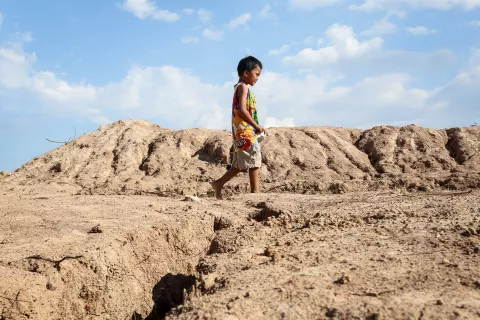Chasing the moonlight: surviving and inspiring in Cambodia
A story of wisdom & courage for UNICEF@75

UNICEF was formed on 11th December 1946 in response to the horrors inflicted on children by World War II. 2021 marks the 75th year of our work for the rights and welfare of children wherever and whoever they may be.
Cambodia is a country all too aware of the terrors of war having been subject to a genocide perpetrated by the Khmer Rouge after its victory in the Cambodian Civil War in 1975.
As part of our 75th anniversary Wisdom Project, in which we interview younger and older generations for lessons on past and present, we asked Santepheap Heng, a survivor of the genocide who is now a UNICEF Water, Sanitation and Hygiene Specialist, to tell us about his experience of war, other childhood memories, his work with UNICEF, and the huge role education has played in his life.

Born in the year the Khmer Rouge took power, Santepheap nevertheless has some fond memories of his early years.
“I loved fishing after school or in the early morning,” he says. “When it was raining at night it was a great time to catch frogs. I had one dog that would always follow me at night and it helped me feel safe and not scared.”
“When the moon was bright me and my friends would play at night. There was no electricity so all of us kids were waiting for the bright moon and if it came we came out and played on the road. We were sad when there was no moon.”


However, Santepheap’s status as oldest son meant these playful childhood memories hide a more serious side.
“I was responsible for looking after my 6 younger sisters and brothers to help my parents. I started fishing at 7-8 years old to help support the family.”
The responsibilities of the eldest son were not the only burdens on young Santepheap’s shoulders. Though the civil war ended in 1975, it marked the start of the genocide and, in a conflict which had already seen them fall victim to unspeakable horror, children continued to suffer appalling outrages.

“If there was gun fire and we were playing we quickly ran back home and hid ourselves with our family in the trench. Every household had its own trench.”
“In 1983 or 1984 one of my friends died playing with unexploded ordnance. There was a big hole in his abdomen and part of his intestine came out. Due to the lack of transport and proper health services his family kept him at home and had to watch him die.”

At the height of the civil war in 1973, UNICEF established its first Cambodia country office but this was forced to close only two years later when the Khmer Rouge, which actively and violently targeted aid organisations, came to power.
After its fall in 1979 – we returned to the country to address the critical humanitarian problems caused by the regime.
“I first heard about UNICEF around 1980 when I was in grade one,’ says Santepheap. “I did not know much about it, but they provided all teaching and learning materials. I remember the blue colour and the UNICEF logo the most.”

On graduating from college in early 1997, Santepheap’s academic success saw him obtain his first job with the Cambodian Mine Action Centre.
“I was so happy to get my first job soon after my graduation. It was a great experience and a very dangerous job as the field mobile medic.”
And it was his father’s focus on education which he believes held him in good stead for his future work.

“Growing up in a teacher’s family, my father was the first role model who inspired me. He always reminded all of us that only education can change our life. He always encouraged us to study hard and said if you want to continue your study, he will do his best to support us.”
“My father is still the most positive influence on my life. He is the one who always encourages me and reminds me to respect people, pay gratitude to those who have helped us, be a good citizen and study hard.”

Now in his fifteenth year as a UNICEF Water, Sanitation and Hygiene Specialist, Santepheap is both grateful to the organisation for its alleviation of childhood suffering in Cambodia and proud of what he has achieved.
“UNICEF was one of the first UN agencies to return to Cambodia. Education is among its greatest interventions as well as health and nutrition, water sanitation and child protection. It supports the most vulnerable groups, especially women and children. Leaving no one behind is one of our mandates.”
“My childhood was ravaged by genocide, hunger and civil war. But I am proud that my experiences gave me life skills which remain with me now.”
Mirroring the advice of his father, he concludes the interview with some simple and fitting advice to the younger generation.
“Education can change your life,” he says.





